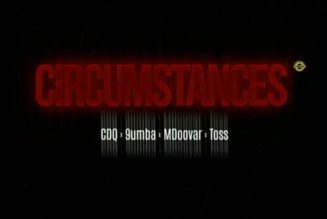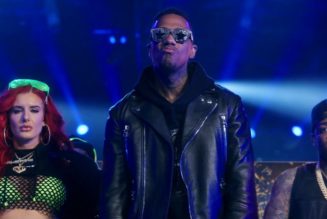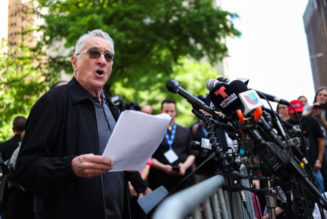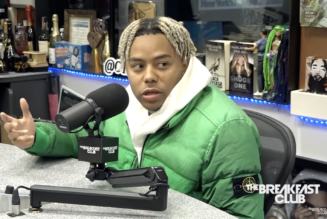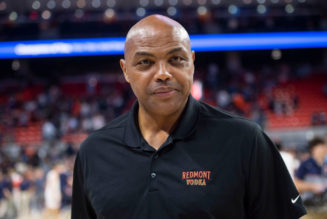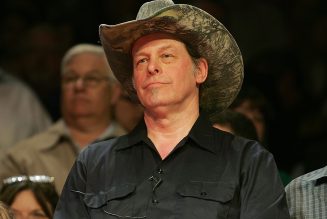
The myth of Jay Electronica has long outweighed the music—in part because there was so little of it. He’s been: touched by Erykah Badu juju; cozy with a Rothschild; a Nas ghostwriter. He got a thousand beats from J Dilla, was anointed by JAY-Z, and was the last man left standing after Kendrick Lamar put the rap world on notice during “Control.” He is a homeless drifter turned enigmatic spiritual guru who accepted a co-sign from notorious Nation of Islam leader Louis Farrakhan, met super-Christian Chance the Rapper halfway on Coloring Book’s “How Great,” and worshipped at Hindu and Buddhist temples in Nepal during personal pilgrimages. But he’s only officially put out one mixtape, two singles, and a handful of other songs since 2007, occasionally appearing out of thin air to guest on songs seemingly at random.
And so with time, the myth grew. What was real and what was fiction began to blur, and what was real mattered less than what was interesting. The ghostwriting claims were disputed, he has never released a song with an original Dilla beat, and many count him as a footnote left in Kendrick’s wake, but he did actually end up between two of the wealthiest families in England. The selection of songs Jay Electronica has released over his career has drawn from all of this, only he’s put out as many of them in 13 years as some prolific rappers put out in a few months. The wait for his debut album has been so long that it became more of an ancient prophecy than a movable release date.
But the album, A Written Testimony, has finally materialized. It is a mystical, distinctive work that nearly lives up to all the lore surrounding the rapper. First and foremost, it is a prayerful offering that expresses the many spiritual and communal virtues he has internalized. But it’s also a record about the scrutiny of an insatiable public, one that leans on higher powers amid self-doubt. In just under 40 minutes, Jay Electronica erects monuments to Allah, NOI founder Elijah Muhammad, and Roc Nation overseer JAY-Z, who is at his side for nearly the entire album serving as sergeant-at-arms. “From a hard place and a rock to the Roc Nation of Islam/I emerged on the wave that Tidal made to drop bombs,” he raps on “Ghost of Soulja Slim.” From this well of deep faith, he summons rap performances that seem to defy space-time.
Like Dr. Dre scrapped the expectation-bogged Detox for Compton, Jay Elec (mostly) starts fresh here. An album called Act II: Patients Of Nobility (The Turn) had been in the offing since 2010, but a sequel three presidential terms in the making carries too much baggage. After waiting more than a decade for an album that will likely never come, fans instead received a brand new album only a few months after its announcement, one made in “40 days and 40 nights”—a period of great biblical significance (Jesus fasted, Moses waited on Mount Sinai for God’s law, Elijah fled in the wilderness). With the exception of “Shiny Suit Theory,” these are new songs, or, at least, previously unreleased ones. Whether the raps are from scribbled verses stashed away in Moleskines since the late 2000s or produced during the 40-day period of inspiration, the album sounds current because Jay Electronica’s rapping is immediate and immutable.
A Written Testimony is largely defined by the space between every note and word. These beats have a subtle grandeur to them that suits the gravitas with which Jay Elec performs. He produced most of the album himself, but the Alchemist and No I.D. follow his lead with gorgeous, unadorned flips. The music of “A.P.I.D.T.A.” is so untouched that the sampled band, Khruangbin, is credited as the producer. The beats on “Ghost of Soulja Slim” and “Ezekiel’s Wheel” affix understated drum kits to fuzzy, lo-fi samples that sound culled directly from TCM standards. Even “The Blinding,” which is split between booming Swizz Beatz and AraabMuzik chant music and elegant Hit-Boy dinner party rap, finds its way onto this tapestry. The unobtrusive but marvelous production allows Jay Electronica to be heard with the greatest clarity; he enunciates each syllable as if etching it into stone. These are his 10 hotep commandments.
Rap is no stranger to Five-Percenter rhetoric. It has touched artists from Wu-Tang Clan to Common, but Jay Electronica is curiously the rapper closest to the Nation of Islam and also the most cagey about his ideology. Through the NOI, as a young man, he found black power and unity, self-sufficiency and self-improvement. The teachings are his backbone and he uses them to lock horns with the devil. On “The Neverending Story,” he turns his origin story into a fable in which religious conviction saved him from destitution and hopelessness. Whether you take his faith at face value, the way he raps about it is mathematical—creating this impressive symmetry out of his life where there seemingly wasn’t any before. He weighs each word carefully and weaves in his own arcane theology. He is focused, convincing, and on message, even if that message is taking Biggie from Rap Mecca to actual Mecca, as Jay Elec flips a line from “Juicy” into one of the Five Pillars: “Remember Rappin’ Duke? Duh-ha, duh-ha/You never thought we’d make it to Lā ilāha illā Allah.”
It’s tempting to frame Jay Elec strictly as a mystic trying to fully unlock his chakras—and it’s hard not to when he’s rapping about the return of the Annunaki, calculating azimuths, or dragging his cross to Nazareth while wearing his crown of thorns—but he balances his mysticism with the down-to-earth perceptiveness of someone who has wandered the globe seeking refuge from sin. For all the time he spends consulting the universe in search of absolute truth, he spends just as much lingering in the traumas of the human condition. “I spent many nights bent off Woodford/Clutchin’ the bowl, stuffin’ my nose/Some of the cons I suffered for prose,” he raps on “Universal Soldier.” He mourns Flint, ICE breaking up families, and mortars striking Palestinians. His poignant verse on “A.P.I.D.T.A.” wrestles with the unceasing pain of experiencing death, even when you find comfort in the existence of the hereafter. The grandiosity is his sales pitch, but the real selling point is the empathy within.
He is supported at nearly every turn by career-redefining performances from rap’s greatest careerist, his billionaire boss JAY-Z. Rappers tend to fall off the cliff at 50, not just losing touch with the culture but losing their grasp of swing, like an aging athlete succumbing to arthritic joints. Hov has been turning back the clock for a while now, but he does something far more impressive here than 4:44’s personal accounting: He contorts into whatever shape is required of him by his host. During his last real foray into tag-team rapping, 2011’s Watch the Throne, JAY-Z was a step slower than his protege Kanye, a disparity largely exposed by his own eagerness to dictate the pace. On A Written Testimony, the God MC seems to simply be ordaining another. JAY clearly loves rapping with Jay Elec. These circumstances give him the chance to set his competitiveness aside and become the conscious technician he always dreamed of being. “My ancestors took old food, made soul food/Jim Crow’s a troll too, he stole the soul music/That’s the blood that goes through me, so you assumin’/I could never sell my soul, they sold they soul to me,” he raps right out of the gate on “Ghost of Soulja Slim.” JAY-Z, who is pretty familiar with the movement, is reanimated by purpose here.
Together, the two Jays exchange epic pyramid raps, settling into a rhythm that would make Raekwon and Ghostface proud. On “Shiny Suit Theory,” JAY-Z raps, “In the world of no justice and black ladies on the back of buses/I’m the immaculate conception of rappers-slash-hustlers,” and that thread of divine providence as the key to overcoming black struggle continues here. JAY-Z and Jay Elec follow this train of thought from two different angles and meet in the middle: The Five-Percenter ideal that the black man is god and the idea that through Allah black people can be granted agency. This is where Jay Elec finds his strength. The dignity and earnestness through which he raps lend all his verses a certain authority. He isn’t asking for reverence, only for onlookers to heed his experience as a man who found religion and its power to transform. What you believe is up to you, Jay Electronica simply wants you to have a little faith.
Listen to our Best New Music playlist on Spotify and Apple Music.

